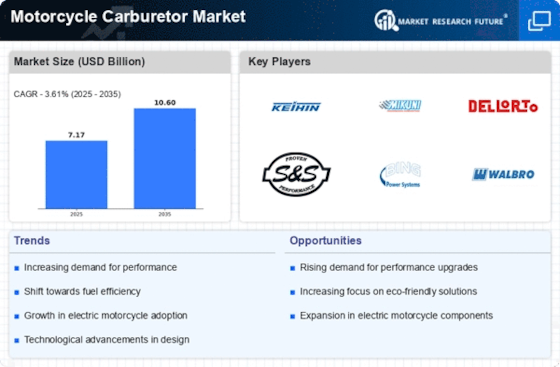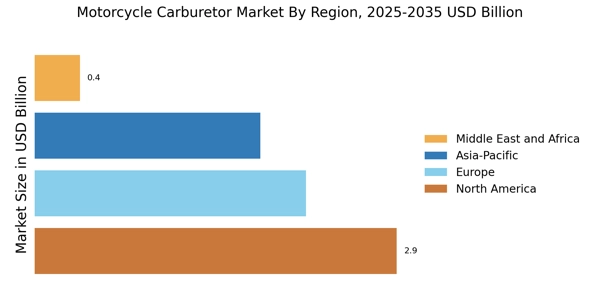Rising Demand for Motorcycles
The Motorcycle Carburetor Market is experiencing a notable increase in demand for motorcycles, driven by a surge in recreational riding and commuting preferences. As urbanization continues to expand, more individuals are opting for motorcycles as a cost-effective and efficient mode of transportation. According to recent data, motorcycle sales have seen a steady growth rate of approximately 5% annually, indicating a robust market potential. This rising demand necessitates the production of high-quality carburetors, which are essential for optimizing engine performance and fuel efficiency. Consequently, manufacturers are focusing on innovation and quality enhancement to meet consumer expectations, thereby propelling the Motorcycle Carburetor Market forward.
Expansion of Aftermarket Services
The Motorcycle Carburetor Market is benefiting from the expansion of aftermarket services, which provide consumers with a wide array of options for maintenance and upgrades. As motorcycle ownership increases, so does the demand for replacement parts and performance enhancements. The aftermarket segment is projected to grow at a rate of 7% annually, driven by the need for reliable and high-performance carburetors. This growth is further fueled by the rise of online retail platforms, making it easier for consumers to access a variety of carburetor options. By focusing on quality and customer service, aftermarket providers can enhance their offerings and contribute to the overall growth of the Motorcycle Carburetor Market.
Growing Interest in Customization
The Motorcycle Carburetor Market is significantly influenced by the growing trend of motorcycle customization. Enthusiasts are increasingly seeking personalized modifications to enhance performance and aesthetics, leading to a rise in demand for specialized carburetors. This trend is particularly prominent among younger riders who prioritize individuality and unique riding experiences. Market data suggests that the customization segment is expanding at a rate of 6% annually, indicating a lucrative opportunity for manufacturers. By offering a diverse range of carburetor options tailored to specific motorcycle models and rider preferences, companies can capitalize on this trend and strengthen their position within the Motorcycle Carburetor Market.
Environmental Regulations and Compliance
The Motorcycle Carburetor Market is significantly impacted by stringent environmental regulations aimed at reducing vehicular emissions. Governments worldwide are implementing stricter standards for fuel efficiency and emissions, compelling manufacturers to innovate and comply with these regulations. The shift towards eco-friendly technologies has led to the development of carburetors that optimize fuel consumption while minimizing harmful emissions. As a result, the market is witnessing a transition towards more sustainable carburetor solutions, which not only meet regulatory requirements but also appeal to environmentally conscious consumers. This regulatory landscape presents both challenges and opportunities for stakeholders in the Motorcycle Carburetor Market.
Technological Innovations in Carburetors
Technological advancements play a pivotal role in shaping the Motorcycle Carburetor Market. The introduction of electronic fuel injection systems and advanced carburetor designs has revolutionized engine performance and efficiency. These innovations not only enhance fuel economy but also reduce emissions, aligning with the increasing regulatory pressures for cleaner technologies. The market has witnessed a shift towards more sophisticated carburetor systems that offer better throttle response and adaptability to varying riding conditions. As manufacturers invest in research and development, the Motorcycle Carburetor Market is likely to see a proliferation of cutting-edge products that cater to the evolving needs of consumers and regulatory standards.

















